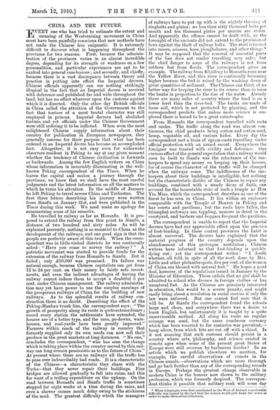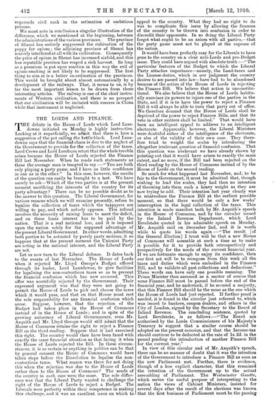CHINA AND THE F 1.11. U.10. E VERY one who has
tried to estimate the extent and meaning of the Westernising movement in China must have been painfully conscious that new methods have not made the Chinese less enigmatic. It is extremely difficult to discover what is happening throughout the provinces for two reasons. First, because the adminis- tration of the provinces varies in an almost incredible degree, depending for its strength or weakness on a few personalities, and particular experiences are apt to be exalted into general conclusions ; and secondly, and chiefly, because there is a vast discrepancy between theory and practice in putting into effect the Imperial decrees. Chinese officials apparently can see nothing strikingly illogical in the fact that an Imperial decree is received with deference and published far and wide throughout the land, but has no effect whatever upon the customs against which it is directed. Only the other day British officials in China called the attention of the Government to the fact that torture of a most brutal character was still employed in prisons. Imperial decrees had abolished torture, and yet officials under the Chinese Government were still ordering it to be inflicted. When even the most enlightened Chinese supply information about their country for publication in European newspapers, they generally assume for their purpose that what has been ordered in an Imperial decree has become an accomplished fact. Altogether, it is not easy even for wideawake observers resident in Peking to say at any given moment whether the tendency of Chinese civilisation is forwards or backwards. Among the few English writers on China whose information is invariably illuminating is the well- known Peking correspondent of the Times. When he leaves the capital and makes a journey through the provinces, we know that we shall have the most careful judgments and the latest information on all the matters to which he turns his attention. In the middle of January he left Peking to travel across China and Turkestan. The first three letters describing his journey were written from Sianfu on January 31st, and were published. in the Times during this week. We need make no apology for summarising some of his remarks.
He travelled by railway as far as Honanfu. It is pro- posed to extend. the railway from this point to Sianfu, a distance of two hundred. and sixty miles. As will be explained. presently, nothing is so essential to China as the development of the railways, and one good sign is that the people are perfectly aware of this truth. When the corre- spondent was in little-visited districts he was continually asked : " Have you come to survey the railway ? " A patriotic movement was started to provide funds for the extension of the railway from Honanfu to Sianfu. But it failed ; only £50,000 was promised. Its failure was natural enough, because Chinese capitalists can get from 12 to 24 per cent. on their money by fairly safe invest- ments, and even the indirect advantages of having the railway cannot induce them to accept a doubtful 5 per cent. under Chinese manaaement. The railway administra- tion may yet have power bto use the surplus earnings of the prosperous railways of China for the building of new railways. As to the splendid. results of railway con- struction there is no doubt. Describing the effect of the Peking-Hankau trunk line, the correspondent says: " The growth of prosperity along its route is quite extraordinary ; round. every station the settlements have extended, the houses are of a better type, and the inns, go-downs, ware- houses, and coal-yards have been greatly improved." Farmers within reach of the railway in country that formerly supplied only its own needs can now sell their produce in the great markets at long distances. " No one," concludes the correspondent, " who has seen the change which is taking place within the country served by this rail- way can long remain pessimistic as to the future of China." At present where there are no railways all the traffic has to pass over indescribably bad roads. It is a characteristic of the Chinese—a characteristic they share with the Turks—that they never repair their buildings. Fine bridges are allowed gradually to fall into ruins, and this for want of a trifling expenditure on the upkeep. On the road. between Honanfu and Sianfu traffic is sometimes stopped. for eight weeks at a time during the rains, and even a shower causes much delay owing to the stickiness of the mud. The greatest difficulty which the managers of railways have to put up with is the nightly thieving of ringbolts and plates ; no less than sixty thousand bolts per month and ten thousand plates per annum are stolen. And apparently the offence cannot be dealt with, as the foresight of the ancients did not extend to the provision of laws against the theft of railway bolts. The steel is turned into razors, scissors, hoes, ploughshares, and other things.* It may be supposed that the removal of essential parts of the line does not render travelling very safe ; but the chief danger to some of the railways is not from robbers but from floods. The correspondent gives an example. The railway from Khaifeng to Honanfu runs near the Yellow River, and this river is continually becoming higher because the bed is raised by the washing down of great quantities of sediment. The Chinese can think of no better way for keeping the river to its course than to raise the banks in proportion to the rise of the water. Already there are many miles of country where the land is on a lower level than the river-bed. The banks are made of loose soil, which is not protected by planting, and the correspondent predicts that unless more science is em- ploved there is bound. to be a great catastrophe.
From Honanfu the correspondent travelled with carts and mules. The traffic along the road was almost con- tinuous, the chief products being cotton and cotton-seed, hemp, vegetable oil, and various hides. Every day the correspondent met a train of opium-carts travelling under official protection with an armed escort. Everywhere the foreigner was treated with civility and deference. One curious effect of the general expectation that a railway would soon be built to Sianfu was the reluctance of the inn- keepers to spend any money on keeping up their houses, for of course the character of the traffic will be changed. when the railways come. The indifference of the inn- keepers about their buildings is intelligible, but nothing but the characteristic dislike of the Chinese to repair any buildings, combined with a steady decay of faith, can account for the lamentable state of such a temple as Hua Yin Miao, which the correspondent describes as one of the finest he has seen in China. It lies within an enclosure comparable with the Temple of Heaven in Peking and has courts and pavilions ; but the roofs have fallen, the triumphal archways are toppling, manure is dried in the courtyard, and barbers and beggars frequent the pavilions.
The correspondent is unable to report that the Imperial decrees have had any appreciable effect upon the practice of foot-binding. In these central provinces the habit is almost universal. The decrees have explained that the material progress of the country depends upon the abandonment of this grotesque mutilation ; Chinese writers have informed. us that foot-binding is quickly dying out ; yet the correspondent writes : " I doubt whether, all told, in spite of all the work done by Mrs. Little and other philanthropists, five per cent. of the women of China are blessed. with natural feet." He hopes a good deal, however, of the regulations issued in January by the Minister of Education. These ordain that no girl shall be admitted to school who dresses in foreign clothes or has unnatural feet. As the Chinese are genuinely interested in education, this would be a, severe penalty, and might easily bring about a revolution in social custom if only the law were enforced. But one cannot feel sure that it will be. At Sianfu the correspondent found the schools large and clean, and everywhere there was a desire to learn English, but unfortunately it is taught by a quite unserviceable method.. All along his route no regular coinage was used, but the same cumbrous currency which has been resorted to for centuries was prevalent,— lump silver, from which bits are cut off with a chisel. Is it not amazing that such customs should persist in a country where arts, 'philosophy, and science existed. in remote ages when some of the present great States of Europe were still overrun by barbarous hordes ? In an article which we publish elsewhere we mention, for example, the careful observations of comets in the Chinese annals,—observations which are more thorough and go back further than any of the corresponding records in Europe. Perhaps the greatest change observable in modern China is the honour now shown to the military profession, which was formerly despised. The correspon- dent thinks it possible that military rank will some day
• When telegraphs were first established in the West of Ireland considerable difficulty was caused by the fact that the women would pull down the wires in order to make themselves-crinolines.
supersede civil rank in the estimation of ambitious persons. We must note in conclusion a singular illustration of the difference, which we mentioned at the beginning, between the administrations of the various provinces. The province of Shansi has entirely suppressed the cultivation of the poppy for opium ; the adjoining province of Shensi has scarcely interfered at all with its cultivation. Consequently the price of opium in Shensi has increased sixfold, and this less reputable province has reaped a rich harvest. So long as a premium is put upon reaction in this way the evil of opium-smoking is not likely to be suppressed. The first thing to aim at is a better co-ordination of the provinces. This would be brought about almost automatically by a development of the railways. That, it seems to us, is by far the most important lesson to be drawn from these interesting articles. The railway is one of the chief instru- ments of Western civilisation, and there is no prospect that our civilisation will be imitated with success in China while that instrument is neglected.















































 Previous page
Previous page